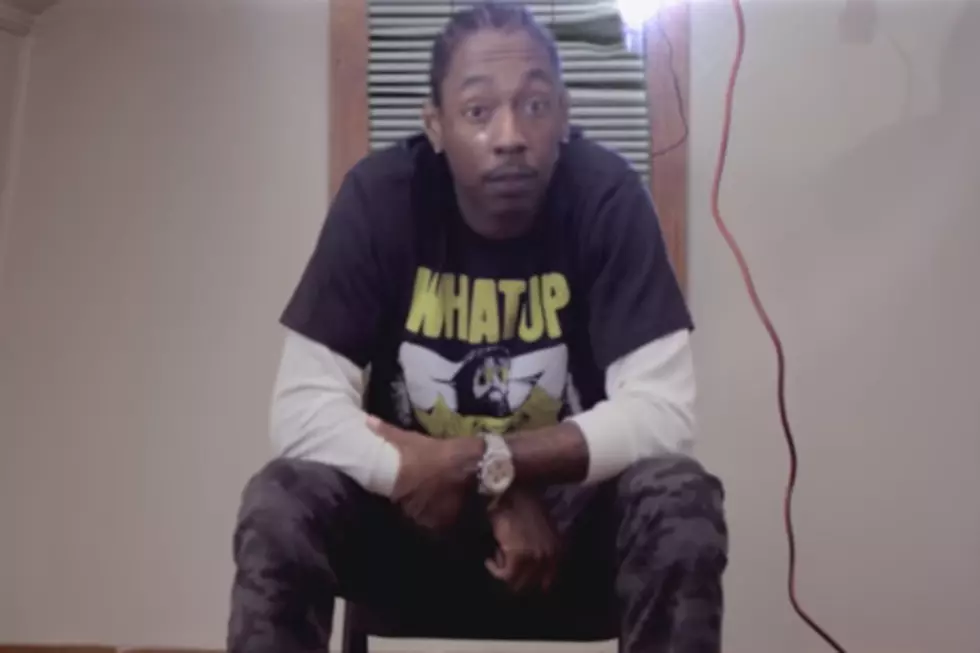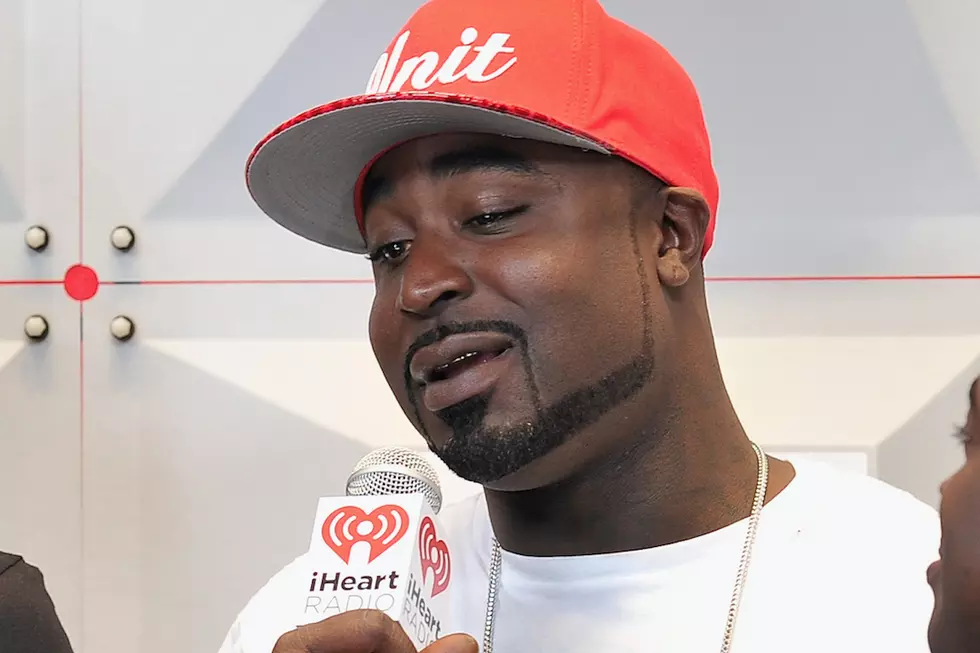
Don Trip & Starlito Talk ‘Stepbrothers 2′, Money and Making Meaningful Music
Serving up southern style with a side of substance, Don Trip and Starlito recently dropped ‘Stepbrothers 2’—the follow up to their 2011 project ‘Stepbrothers’—and in the process they're solidified their rep as the duo fans of reality rap need to know about.
Originally set to premiere to the 13-track mixtape via LiveMixtapes, the Tennessee duo was surprised to hear from NPR (National Public Radio), who requested to debut ‘Stepbrothers 2’ before its Oct. 15 release date. Understanding that taking advantage of the NPR opportunity would not only be a “privilege,” but an “honor,” Trip and Lito took the path less followed when premiering music because they knew it would “help [their] music reach another platform,” says Starlito.
At one point in their careers it seemed like success was guaranteed -- Don Trip's 'Letter To My Son' was a hit featuring Cee-Lo Green and Starlito had been signed to Cash Money Records -- but in this game nothing is promised. Regrouping from industry ups and downs the partners in rhyme got back to basics working with one another and making the quality music that took them to those heights in the first place.
On 'Stepbrothers 2' 'Lito and Trip talk about everything from the love of a woman to freeing the boys from the bing. They spoke to TheBoombox about the project and why they feel it's important to offer a message—fun or conscious—in every song.
The Boombox: Starlito was quoted as calling the first ‘Stepbrothers’ project a “perfect accident.” What would you call this one?
Starlito: It’s cliché, but I wanna say controlled chaos. We were really methodical about the approach. [The project’s] all over the place, but [that’s] by design. We tried to give our listeners the spectrum of lyricism and content ’cause normally you only get one or the other. Whatever we’re doing, we wanted to make sure we complemented it—so for every ‘Leash on Life’ there’s a ‘Shut Up.’
Of all the places available to stream and preview music these days, why NPR?
Don Trip: They reached out to us. We were quite appreciative of that. It’s an honor and privilege. That let us know we was on the right track.
Starlito: [NPR’s] not typical for some underground rap stuff. I think we opened a lot of new ears from that stream. I can just already tell—even I had my rap nerd friends like, “Oh sh-t! This sh-t’s on NPR.” I can tell that that helped our music reach another platform. We were actually planning to release the stream through LiveMixtapes. ‘Stepbrothers’ had 110,000 downloads; the mixtape listing had 800 and something thousand views. But LiveMixtapes was cool with [the change].
Between both ‘Stepbrothers’ projects, your content carries some intense messaging—from 'Pray For Me' to ‘Leash On Life.’ Do you think you guys have a responsibility to give real lyricism back to rap?
Don Trip: For me, I don’t really give a sh-t what rap does. I just try to give [people] something I know another person can’t offer. I try to give you as much of me and as much of my story as I can possibly give.
Starlito: It wouldn’t be worth doing, to me, if we weren’t talking about something. ‘Pray for Me’ was one of the last records we made on the first project. [It] was almost like a plea. I’m like, “Mama, please pray for me.” It’s like a desperation almost. You gotta think, Trip was at the tail end of his first set of The Don Trip Show… he had bunch a shows and was in the club at work, but that was our reality. I had come off an independent tour right before we did ‘Stepbrothers’ one—people standing on the couch just poppin’ bottles was our reality too.
Knowing you focus on rapping about your reality, why such an emphasis on money throughout both projects?
Don Trip: Other than family, money’s the most important thing in the world. You can’t take care of your family without money, and you can’t do anything else in the world without money.
Starlito: Maybe it’s just me, but I find the more money I get the less important it becomes. But that’s to also say I’m nowhere near a space where I’m not thinking about getting money. It’s not like I’m worshiping money or I’m caught up on it, but it’s impossible not to deal with it. We go and have a celebration dinner [because] we just dropped this album and it’s cheers, but then the check comes. You just can’t get around it. It’s everywhere. You don’t have to be caught up or money hungry for it to become an issue in your life. Not having money is like one of the worst feelings. We have a few records rapping about people being broke and people being f--ked up. We’re still talking about money, and that’s real. We’re just trying to take that realistic approach. When we’re talking about getting money like the “Shut up, I’m grinding/If you’re looking for me, let’s talk money that’s the only way you’re gonna find me” that’s real.
In ‘Stepbrothers’ you both talk about women in a lyrically tasteful manner, but on ‘Stepbrothers 2’ it seems like you just went straight for the bitch and slut tactic. Did one of you get your heartbroken along the way?
Don Trip: The way we record, I guess we kind of record in spurts and I guess we record it in the mood that we’re in. Really, with the ‘Stepbrothers’ project, we didn’t wanna make it toned towards nothing. We wanted it to be wide enough for you to get every aspect out of it that you could. We didn’t want you to hear seven songs about women and you think we’re turning into R&B singers. So we tried to give it a balance.
Starlito: I can’t agree about it being harsh or about us being brokenhearted. If anything, it may be a little brokenhearted or [us] kinda torn between where we are and the lifestyle that we live and maybe where we would want to be. I think you get traces of that in the album. I think the records that cater to relationships are respectful. They’re respectful to our feelings towards the nature of those kinds of situations. I would be cool playing either one of those songs in front of my grandmother.
On the first project, you guys talk a lot about “making it.” Do you feel like where you guys are now means you’ve made it in your careers?
Don Trip: I can say we’ve made it further than we were two years ago, [but] I wouldn’t go as far as saying we made it. To say we made it would be saying that where I’m at right now is where I wanna be, and I truly can’t say that because I wanna go as far as I can go and this is not as far as I can go. This is as far as I’ve come…but I can’t say this is where I wanna sit.
Starlito: At the end of the day because we make honest music and because a great deal of our music is catered toward a true-to-life experience it’s impossible for us to not talk about that because that’s where we are. We aren’t super rich and so famous that we can’t walk outside of this building without being harassed, so in a sense we are still striving and we still aspire to make it. I do feel that I’ve come a long way, and like Trip said, it’s not like a complacency or an I’ve-arrived-so-I’m-good [feeling] ’cause I’m working to not have to work. But it is really fulfilling to just take in what we’ve been able to accomplish and that we’re still on course and on path to do even more with it.
Considering where the music industry is these days, how do you even define “making it?”
Don Trip: As long as I can provide for my family…then I think I’m being successful. [It’s] when I can provide for my entire family, and it not be a burden on me. Until then, I think I have yet to reach the success I’m looking for.
Starlito: I honestly am in a space where I feel successful. I feel like I’m doing what I set out to do, and I don’t have any measuring stick for that. I dropped out of college to rap, and now I’m finally all the way in a space where it seems like the right decision to have made. The fact that I’m on course for bigger and better things, that’s promising enough. That keeps me inspired.
More From TheBoombox

![Starlito Releases Scathing Young Buck Diss Track ‘You Should Be Proud’ [LISTEN]](http://townsquare.media/site/625/files/2017/07/Starlito-You-Should-Be-Proud.jpg?w=980&q=75)







